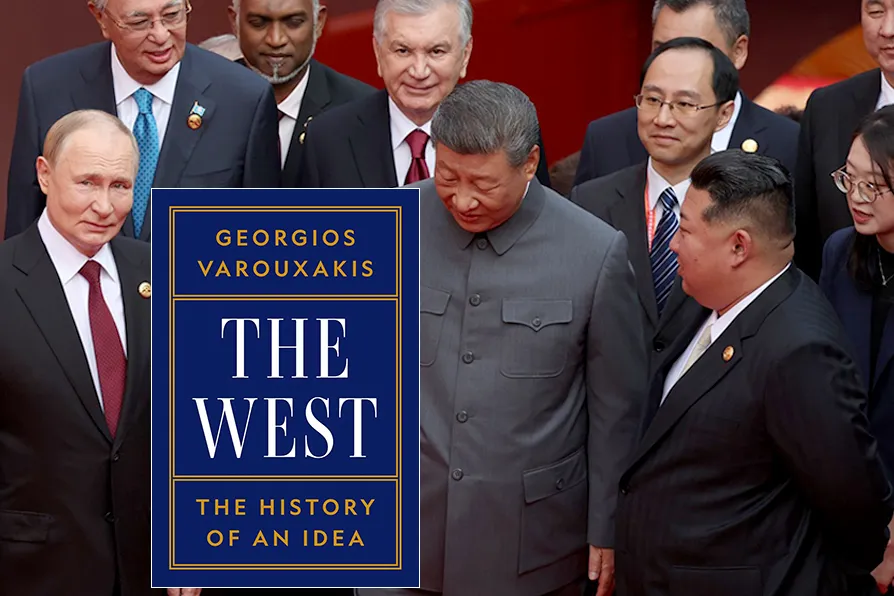JOHN GREEN, MARIA DUARTE and ANGUS REID review Fukushima: A Nuclear Nightmare, Man on the Run, If I Had Legs I’d Kick You, and Cold Storage
BRENT CUTLER is intrigued by the imperialist, supremacist and contradictory history of a word that is used all too easily

 THE NON WEST? General Secretary Xi Jinping of the Chinese Communist Party and world leaders attending the 2025 China Victory Day Parade in Beijing [Pic: The President of Russia/CC]
THE NON WEST? General Secretary Xi Jinping of the Chinese Communist Party and world leaders attending the 2025 China Victory Day Parade in Beijing [Pic: The President of Russia/CC]
The West — The History of an Idea
Georgios Varouxakis, Princeton UP, £35
THE West is more of an idea than a place; in his book the West — The History of an Idea, Georgios Varouxakis traces its history.
The concept of the West can be traced through a series of historical events: the Graeco-Persian Wars of the fifth century BC; the division of the Roman empire into East and West in the fourth century AD; and with the empire of Charlemagne in the ninth century AD, becoming Western Christendom. The idea crystallised in the 18th and 19th centuries with the Enlightenment, the development of liberty and democracy.
There has to be some reference to geography as it is a point on a map; its core is western Europe and it later came to include North America and Australasia.
According to Varouxakis the idea of the West was developed by the French philosopher Auguste Comte (1798-1857). Comte developed the idea of Occidentalism, in which he saw the West as being in the vanguard of humanity which, due to its superiority, had been given a leadership role over the rest of the world. Although Comte was a critic of imperialism, his ideas have been used to justify actions of imperialist powers from the 19th century onwards.
The West itself was distinct from Europe, and stood in opposition to the Russian threat which then and still today was seen as Eastern and despotic.
Varouxakis traces how the idea of the West evolved throughout the 19th and 20th centuries and into the 21st. He explains how Russia became excluded from the West, and includes arguments for its inclusion.
The middle chapters cover how the idea of the West came unstuck during the Great War, when Western powers aligned with non-western Turkey and Russia, whilst fighting each other. During the conflict Germany claimed to be defending the West against Asiatic Russia; whilst the Entente Powers pointed to the German alliance with Ottoman Turkey. These problems continued through the inter-war years and World War II with talk of the West either being in decline or needing to be defended.
Toward the end of World War II, with the increasing importance of the US, there arose the new definition of the so-called “Atlantic Community,” as distinct from the West. The chapter on the Cold War covers the twists and turns of European and US foreign policy; both in relation to the socialist camp and towards each other.
World War II has often been viewed as a conflict between pro and anti-Enlightenment ideologies. Liberalism, as represented by Britain, the United States and the Free French, and socialism, represented by the Soviet Union, all have their roots in the 18th century Enlightenment. Whilst fascism, represented by the Axis powers, was opposed to the Enlightenment. This is touched upon in the chapter on the post-Cold War era which states there is a “traditional West” based on Classical civilisation and Christianity, and a “modern West” based on the Enlightenment. It is also suggested that the Cold War was a conflict between the two pro-Enlightenment ideologies of socialism and liberalism — a conflict between liberty and democracy.
The chapter on the post-Cold War era focuses on Samual Huntington’s Clash of Civilisations and Francis Fukuyama’s End of History. Huntington believed that with the end of the Cold-War the West faced new challenges from rival civilisations, which he lists as Islamic, Orthodox, Hindu, Japanese and possibly African and South American, whilst Fukuyama claimed the end of the Cold War meant the final triumph of the West.
This book is a history of the idea, and not a critique of it. However the twists and turns around what constitutes the West indicate serious flaws with the idea. Some of worst conflicts in history have been between Western powers; not just the first and second world wars but also Napoleonic wars, The Thirty Years War, The Hundred Years War to name but a few.
In living memory Western powers have been more than willing to support Asiatic despotism against secularism or socialism. Meanwhile, the West has overwhelmingly been an idea of the right, from liberalism to fascism, even while they disagree about its meaning.

MARTIN HALL welcomes a study of Britain’s relationship with the EU that sheds light on the way euroscepticism moved from the margins to the centre

In a speech to the 12th Xiangshan Forum in Beijing, SEVIM DAGDELEN warns of a growing historical revisionism to whitewash Germany and Japan’s role in WWII as part of a return to a cold war strategy from the West — but multipolarity will win out

RON JACOBS salutes a magnificent narrative that demonstrates how the war replaced European colonialism with US imperialism and Soviet power










